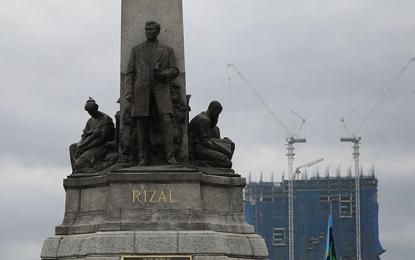Breaking
Rise of Torre signals ‘death of national heritage’

A lawmaker on Thursday criticized the Supreme Court decision allowing the construction of the 49-story Torre de Manila located near Luneta Park in Manila. (PNA photo)
MANILA—A lawmaker on Thursday criticized the Supreme Court decision allowing the construction of the 49-story Torre de Manila located near Luneta Park in Manila.
In a statement, Quezon City Rep.
Winnie Castelo said the high court “erred” with its 9-6 decision to lift the temporary restraining order (TRO) on the construction of the DMCI Project Developers, Inc. condominium.
The SC also junked the petition filed by the Knights of Rizal (KOR) against DMCI Homes, Inc.
and DMCI Project Developers, Inc., City of Manila, National Commission on Culture and the Arts, National Museum, and National Historical Commission of the Philippines.
Castelo said the decision signals the “death of national heritage” as the controversial building, dubbed as “national photo bomber”, obstructs the view behind the historic monument of national hero Jose Rizal.
“Commercialism and business should never take precedence over national heritage,” he added.
Castelo, who led a congressional probe on the Torre de Manila construction as Metro Manila Development committee chair, also urged the petitioners to file a motion for reconsideration to reverse the SC ruling.
“I appeal to the Knights of Rizal and their Supreme Commander, former Chief Justice Reynato Puno, to exhaust all remedies by filing a motion for reconsideration before the Supreme Court,” Castelo said.
The SC ruled that there is no law prohibiting the construction of the building and also rejected the argument of KOR that DMCI violated several laws mandating the protection and preservation of the Rizal Monument by defacing the visual corridors of the monument.
Castelo argued that while there may be no law specifically prohibiting the construction of Torre de Manila, the Constitution and the National Cultural Heritage Act of 2009 (Republic Act 1066) provide for the protection and preservation of Philippine heritage.
“The SC should have taken the letter and spirit of the Constitution and RA 10066 or the National Cultural Heritage Act of 2009, which have a bearing on the case,” he said.
Castelo cited the case of the sale of Manila Hotel in 1997, wherein the SC voided the sale of the hotel to a foreign investor on the ground that the hotel formed part of “national patrimony” protected and reserved for Filipinos by the 1987 Constitution.





















